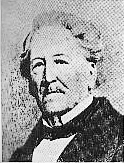Fontaine Ministry
[1] This had only become possible after popular unrest had broken out under governor Gaspard-Théodore-Ignace de la Fontaine in March 1848.
After the elections, de la Fontaine, Vendelin Jurion, Charles-Mathias Simons and Jean Ulveling were retained as members of the government; Théodore Pescatore resigned and was replaced with Jean-Pierre André.
Domestically, two issues predominated in this period: the law on communes (23 October), which established limits on the communes' autonomy and government control, and the naturalisation law (12 November), which caused the government to lose confidence in the Chamber, due to which it had to resign on 2 December 1848.
[3] The de la Fontaine government tried to bring about a strong integration in the German Confederation, fearing revolutionary influences from France and Belgium.
The government, against the wishes of public opinion, took an active part in German politics, and even supported the decision of the Constituent Assembly to send Luxembourgish delegates to the short-lived Diet of Frankfurt, where they debated over German unity.
